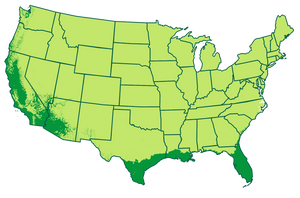* Images shown are of mature plants

Have questions? Talk with our Plant Experts (800) 973-8959
Save 25% on $200+ with code FALL25.
Questions? Call our plant experts: (800) 973-8959
Cold Hardy, Clementine-like Oranges
Why Owari Satsuma Mandarin Trees?
Our Owari Mandarin Tree is one-of-a-kind, growing anywhere in the country as a patio plant and withstanding brief temperature drops down to 12 to 15 degrees. With the Owari, you get sweet, delicious oranges, no matter where it’s planted.
And because it's the cold hardiest orange tree, you're not limited to location in growing the Owari Mandarins, also known as Satsumas. Basically, they can be grown anywhere, whether you grow them outdoors or in a container to bring inside during chilly weather.
Plus, they're drought tolerant and easy to grow. You've probably bought these at the grocery store and didn't even realize it. They look, taste and peel just like clementines - it's difficult to tell them apart. Though you'll find that they're very sweet and even better than store-bought: Our Owaris are easy to peel and have very few seeds.
Why FastGrowingTrees.com is Better
With an Owari Mandarin Tree, you'll get a continual supply of fresh vitamin C all winter long. Your tree is packaged with care and will arrive healthy with deep green leaves. And though our small trees are capable of producing fruit, our large trees are already producing an amazing amount of fruit, so you can get instant results.
Because we've nurtured them meticulously at our nursery, they're ready to thrive. No need to wait years to get beautiful fragrant blooms that fill the air with a fresh scent. Many times, our trees arrive with fruit already on them! Like most citrus trees, they like to dry out before being watered and can be pruned to your desired size. If left untrimmed, they will eventually grow to 10-12 feet in height. Order your Owari Mandarin Tree today!
Pollination Info
Owari Satsuma Mandarin Tree Pollination
Owari Satsuma Mandarin Trees are self-fertile. You will get fruit with only one plant. However, adding an additional Owari Satsuma Mandarin Tree will drastically increase the size of your crop.
Planting & Care
1. Planting: Choose a location where your tree is going to get plenty of sunlight - 6 to 8 hours per day is best. These trees also do better in areas with high humidity, so you may also need to create humidity for your tree by misting the leaves daily with water.
If your winter temperatures are consistently below 40 degrees, plant your tree in a container that can easily be brought outside in the summer months and inside for the winter. Choose a pot slightly larger than what it was shipped in (1 to 2 pot sizes) that has plenty of holes in the bottom to allow for drainage. Be sure to plant in well-draining potting soil preferably recommended for acid-loving citrus plants.
2. Watering: Set a weekly watering schedule for the best results. After watering, allow the top 2 to 3 inches of the soil to dry out completely before watering again.
But for potted Mandarin Trees, it's easiest to stick your index finger into the soil down to about 2 inches. If there is moisture present, hold off on watering until it feels drier at that depth. When you're ready to water, stop once you see water escaping the drainage holes at the base of the pot.
3. Pollination: This tree is self-fertile and will produce fruit on its own, but if you want to increase your crop size, you can provide additional pollination by hand. To do this, simply take a small, dry, fine-tipped paintbrush and stick it into the center of the bloom. Swirl it around and collect the pollen on the brush. Go to the next bloom and repeat the process until every bloom has been treated. The bloom will fall off naturally and the fruit will begin to form.
4. Fertilizing: Feed your Mandarin Tree during the warmer spring and summer seasons with a citrus-specific fertilizer, such as the one included in our Citrus Care Kit, once every six weeks. During the fall and winter season, ease back to fertilizing once every 2 to 3 months.
5. Pruning: Prune ground-planted Mandarins in any season (except for winter) by making 45-degree angle cuts to remove dead or crossing limbs and also to thin out the tree to allow more light. After the tree fruits, remove any dead wood and ventilate the center of the tree. Remove suckers as they form/grow from the base. Pruning can be done at any time of the year for the potted Mandarin.
FAQs
Are mandarins and Satsumas the same?
What is the difference between a Satsuma, a tangerine, and a mandarin?
What does Satsuma mandarin taste like?
Shipping Details
Estimated Shipping Time: Most orders ship immediately. As noted on the website, some items are seasonal, and may only ship in spring or fall. Once your order is shipped, you'll receive an email with a tracking number.
| Amount of Order | Shipping Charge |
|---|---|
| Less than $49 | $19.95 |
| $49 + | FREE SHIPPING! |
Product Details
| Mature Height: | 8 ft. |
| Mature Width: | 10 ft. |
| Sunlight: | Full-Partial |
| Growth Rate: | Moderate Growing |
| Botanical Name: | Citrus reticulata 'Owari' |
| Does Not Ship To: | AK, AL, AZ, CA, FL, GA, HI, LA, MS, OR, TX |
| Grows Well In Zones: | 3-11 patio / 9-11 outdoors |
| Your Growing Zone: | # |









